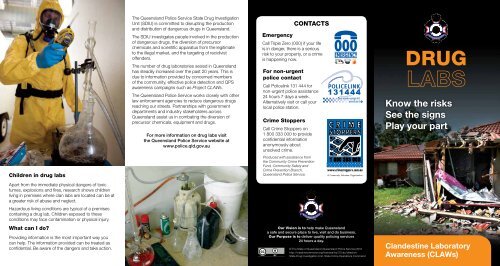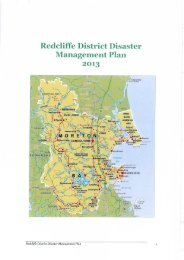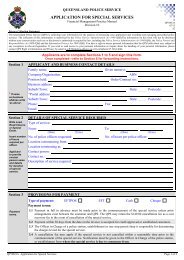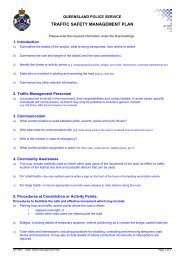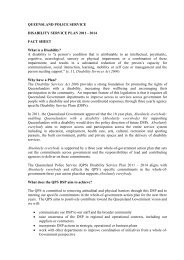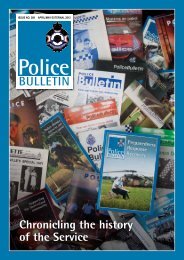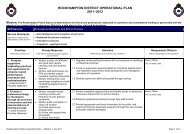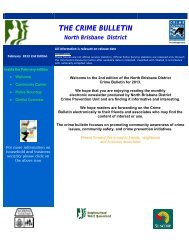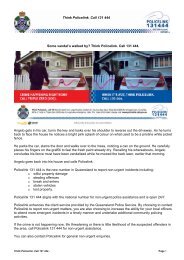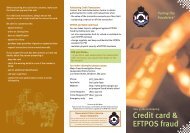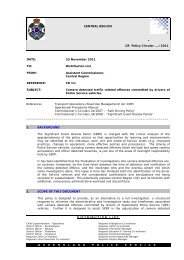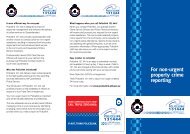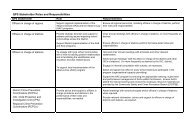CLAWS Brochure - Queensland Police Service
CLAWS Brochure - Queensland Police Service
CLAWS Brochure - Queensland Police Service
Create successful ePaper yourself
Turn your PDF publications into a flip-book with our unique Google optimized e-Paper software.
The <strong>Queensland</strong> <strong>Police</strong> <strong>Service</strong> State Drug Investigation<br />
Unit (SDIU) is committed to disrupting the production<br />
and distribution of dangerous drugs in <strong>Queensland</strong>.<br />
The SDIU investigates people involved in the production<br />
of dangerous drugs, the diversion of precursor<br />
chemicals and scientific apparatus from the legitimate<br />
to the illegal market, and the targeting of recidivist<br />
offenders.<br />
The number of drug laboratories seized in <strong>Queensland</strong><br />
has steadily increased over the past 20 years. This is<br />
due to information provided by concerned members<br />
of the community, effective police detection and QPS<br />
awareness campaigns such as Project CLAWs.<br />
The <strong>Queensland</strong> <strong>Police</strong> <strong>Service</strong> works closely with other<br />
law enforcement agencies to reduce dangerous drugs<br />
reaching our streets. Partnerships with government<br />
departments and industry stakeholders across<br />
<strong>Queensland</strong> assist us in combating the diversion of<br />
precursor chemicals, equipment and drugs.<br />
For more information on drug labs visit<br />
the <strong>Queensland</strong> <strong>Police</strong> <strong>Service</strong> website at<br />
www.police.qld.gov.au<br />
Emergency<br />
Call Triple Zero (000) if your life<br />
is in danger, there is a serious<br />
risk to your property, or a crime<br />
is happening now.<br />
For non-urgent<br />
police contact<br />
Call <strong>Police</strong>link 131 444 for<br />
non-urgent police assistance<br />
24 hours 7 days a week.<br />
Alternatively visit or call your<br />
local police station.<br />
Crime Stoppers<br />
CONTACTS<br />
Call Crime Stoppers on<br />
1 800 333 000 to provide<br />
confidential information<br />
anonymously about<br />
unsolved crime.<br />
EMERGENCY<br />
DRUG<br />
LABS<br />
Know the risks<br />
See the signs<br />
Play your part<br />
Children in drug labs<br />
Produced with assistance from<br />
the Community Crime Prevention<br />
Fund, Community Safety and<br />
Crime Prevention Branch,<br />
<strong>Queensland</strong> <strong>Police</strong> <strong>Service</strong>.<br />
Apart from the immediate physical dangers of toxic<br />
fumes, explosions and fires, research shows children<br />
living in premises where clan labs are located can be at<br />
a greater risk of abuse and neglect.<br />
Hazardous living conditions are typical of a premises<br />
containing a drug lab. Children exposed to these<br />
conditions may face contamination or physical injury.<br />
What can I do?<br />
Providing information is the most important way you<br />
can help. The information provided can be treated as<br />
confidential. Be aware of the dangers and take action.<br />
Our Vision is to help make <strong>Queensland</strong><br />
a safe and secure place to live, visit and do business.<br />
Our Purpose is to deliver quality policing services<br />
24 hours a day.<br />
© The State of <strong>Queensland</strong> (<strong>Queensland</strong> <strong>Police</strong> <strong>Service</strong>) 2012<br />
http://creativecommons.org/licenses/by/3.0/au/deed.en<br />
State Drug Investigation Unit, State Crime Operations Command<br />
Clandestine Laboratory<br />
Awareness (CLAWs)
Use your knowledge<br />
This brochure is designed to inform you about the<br />
dangers of drug labs also known as clandestine<br />
laboratories or “clan labs”.<br />
Drug labs are a major concern. Not only are they the<br />
source of dangerous and illicit drugs, but their existence<br />
can be extremely hazardous and potentially lethal to<br />
members of the community, including children.<br />
The ingredients used to produce illicit drugs are highly<br />
toxic, flammable and incredibly dangerous. Drug labs<br />
explode, ignite and emit harmful gases that can cause<br />
serious health problems and can be life-threatening.<br />
Information supplied to police from the community<br />
regarding suspicious activity or the location of drug<br />
production equipment or materials can be confidential<br />
and can help us locate and safely dismantle these<br />
highly unstable and dangerous set-ups.<br />
THE MOST IMPORTANT THING TO REMEMBER<br />
IS NEVER TOUCH ITEMS YOU SUSPECT<br />
ARE DRUG RELATED. IF YOU SUSPECT A<br />
DRUG LAB IS PRESENT, DO NOT ENTER THE<br />
PREMISES. IF ALREADY INSIDE THEN LEAVE<br />
IMMEDIATELY AND CONTACT POLICE.<br />
What does a drug lab typically look like?<br />
Drug labs are quite often found in residential areas<br />
including, rented premises, houses, apartments/units,<br />
hotel and motel rooms, garages, rural properties and<br />
regional areas and self-storage units.<br />
Most drugs labs detected in <strong>Queensland</strong> are small and<br />
therefore highly portable. For this reason, laboratories can<br />
also be located inside vehicles including trucks, caravans,<br />
boats, trailers and cars.<br />
A drug lab can range from improvised items including<br />
a few saucepans and glass jars to an elaborate system of<br />
laboratory glassware.<br />
Drug labs can also include a pill press, tablet press or<br />
encapsulator.<br />
What do drug labs produce?<br />
Australian drug labs produce a range of illicit drugs<br />
including:<br />
• amphetamines and methylamphetamines –<br />
commonly referred to as “speed” or “ice” and are<br />
highly addictive<br />
• 3,4-Methylenedioxymethamphetamine (MDMA) –<br />
street name “ecstasy”<br />
• heroin and “home-bake” heroin<br />
• lysergide (LSD)<br />
• gamma hydroxybutyric acid (GHB) - street name<br />
“fantasy”<br />
• paramethoxyamphetamine (PMA)<br />
• other chemically-based dangerous substances.<br />
Drug labs can also include cocaine extractions, synthetic<br />
cannabis manufacture and indoor hydroponic cannabis<br />
grows. Marijuana grows present risks, ranging from the<br />
ingestion of moulds and other harmful substances to the<br />
potential for electrocution.<br />
Synthetic drugs are produced using highly toxic<br />
chemicals mixed together with other substances. The<br />
end product is highly toxic, corrosive, flammable and can<br />
present a very real risk of explosion.<br />
Why are drug labs dangerous?<br />
Drug “cooks” have little regard for themselves or the<br />
welfare and safety of the community.<br />
Because of the mix of precursor chemicals and<br />
substances used in drug production, drug lab sites<br />
have been known to cause explosions, flash burns, fires<br />
(including house fires), toxic fumes, poisonous gases,<br />
damage to the environment, injury to members of the<br />
community and even death.<br />
Exposure to the toxic by-products of these substances<br />
can cause immediate harm and can be life threatening.<br />
Prolonged exposure to chemicals used in drug labs may<br />
contribute to serious long term health issues (including<br />
brain, liver and kidney damage and cancer).<br />
The location of drug labs in highly built-up and residential<br />
areas is always a concern for law enforcement and other<br />
government agencies. The waste produced from drug<br />
labs may also cause harm to the environment.<br />
Detecting drug labs is a major priority for police and<br />
information from the public is crucial in helping us detect<br />
and safely dismantle them.<br />
What are some of the<br />
indicators of a drug lab?<br />
• Items of a suspicious nature including<br />
improvised heating and cooling mechanisms<br />
• Other used materials (cold and flu packets,<br />
empty pseudoephedrine blister strips, gas<br />
cylinders or butane fuel cans, stained coffee<br />
filters, pH testers or test strips, water pumps)<br />
surrounding a property<br />
• An unusual chemical smell<br />
• Plastic containers (with or without chemical<br />
labels) at the premises<br />
• Laboratory glassware being carried into a<br />
premises or present at a premises<br />
• Fan or pump type noise coming from the<br />
premises<br />
• Residents never putting their rubbish out or<br />
burning their rubbish<br />
• Little or no traffic at a residence during the<br />
day, but frequent traffic late at night or at<br />
odd hours<br />
• Windows blackened out or extra effort to<br />
ensure windows and doors are covered or<br />
reinforced<br />
• Evidence of unusual electrical work<br />
surrounding the premises<br />
• Noticeable hoses and pipes near windows<br />
or doors<br />
• Installation of extractor fans (especially in<br />
garages/sheds)<br />
• Recently rented premises where residents<br />
are rarely there<br />
• A new tenant willing to pay rent months in<br />
advance, using only cash<br />
• New rental applicants who try to avoid<br />
background checks<br />
• Chemical/reaction waste (often carelessly<br />
disposed of).


